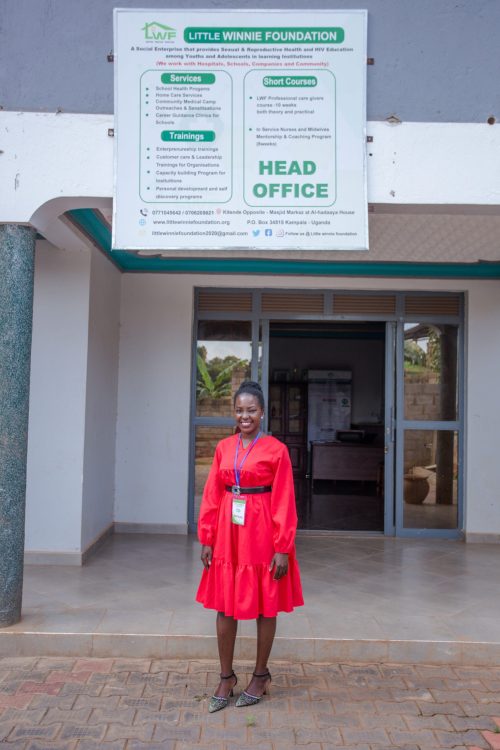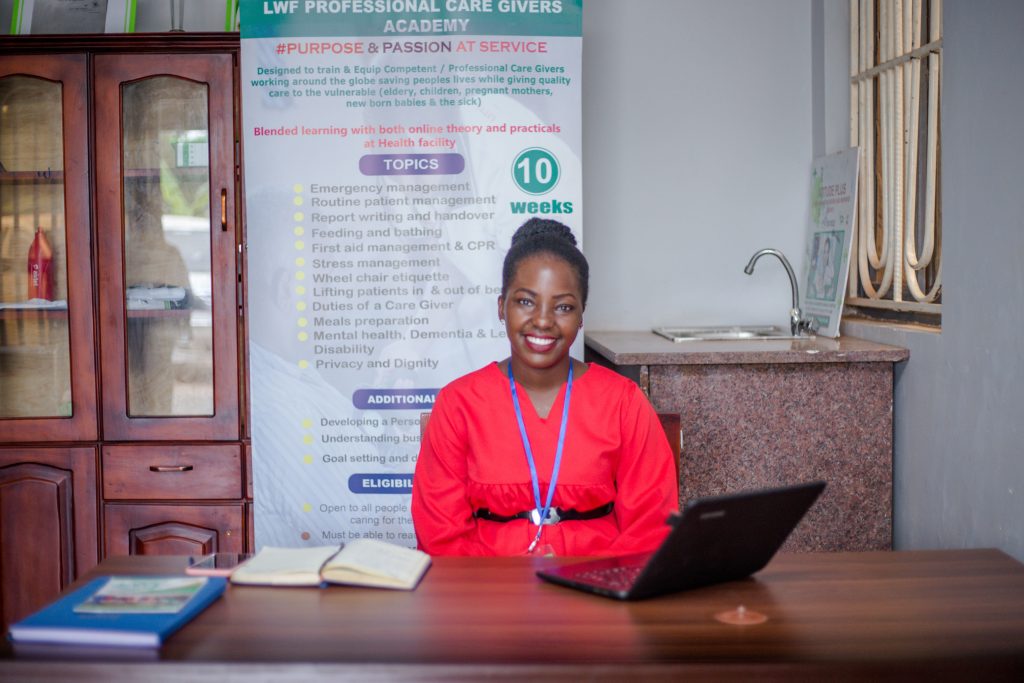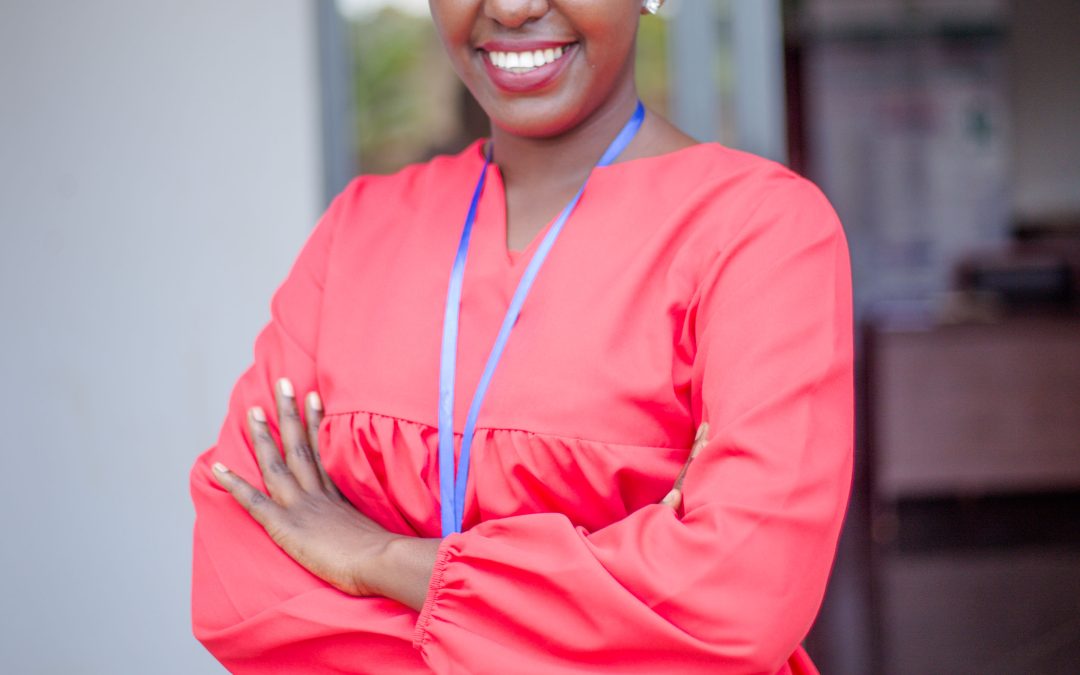Empowering Women Entrepreneurs: The POWER to Transform Family Planning in Uganda
Meet Winnie Nabukeera, Chief Executive Officer of Little Winnie Foundation, a new social enterprise in Uganda part of the POWER family (Providing Opportunities for Women in Entrepreneurship and Reproductive Health). POWER is a new startup accelerator partnership funded by DSW and led by Action for Health Uganda. The program focuses on providing training, capacity development, and mentoring to women entrepreneurs in Uganda aged 18 to 30. The primary aim of which is in the empowerment of these young women towards the development of sustainable businesses in the fields of family planning and sexual reproductive health and rights (FP/SRHR).
Little Winnie Foundation (LWF) is a social enterprise founded in 2019 by Winnie and a group of passionate medical students from Mengo School of Nursing and Midwifery, the oldest school of its kind in Uganda. LWF offers comprehensive education on FP/SRHR and HIV to young individuals aged 13-30. Through various outreach initiatives, the team has extensively engaged with schools as part of their model program, effectively raising awareness about HIV among children and youths across different educational levels. With the launch of the POWER pilot, this social enterprise initiated a mentorship and coaching program tailored for nurses, midwives, and professional caregivers. Their primary goal is to assist nurses and midwives in discovering and harnessing their purpose and passion, transforming it into a sustainable source of income. Currently, the foundation has successfully secured an office space and training center in Bweya-Kitende, situated off the Kampala-Entebbe Highway in the Wakiso district, southwest of Kampala, Uganda’s capital city.
Q1: Winnie, can you share with us your journey of becoming an entrepreneur and what inspired you to start a business in the family planning and sexual reproductive health and rights (FP/SRHR) sector?
My journey as a social entrepreneur commenced back in 2019 during my time as a student at Mengo School of Nursing and Midwifery. My passion to empower youths with accurate SRHR as well as HIV information, was fueled by a desire to combat the HIV scourge. Growing up in Masaka city and witnessing the devastating impact of HIV/AIDS, epitomized by the nickname “Magombe Street” or “Grave Street” for its losses, deeply influenced my mission.
In this region, HIV had taken numerous lives, particularly among the sexually active age group of 10-19 years. Accessing health services was compounded by complaints about the unprofessional behavior of healthcare workers, especially midwives and nurses, who were perceived as rude and unfriendly. This hindered youths and adolescents from seeking essential health services. These circumstances inspired me and my team of three nurses to identify a critical gap. We established the Little Winnie Foundation with the purpose of defining the pivotal role of professional healthcare workers in enhancing health-seeking behavior and the uptake of FP/SRHR services among young people.
Q2: How has your participation in the POWER pilot project affected your business and personal growth? Are there any specific skills or knowledge that you gained during the program that have been particularly valuable?
The POWER accelerator program proved to be a pivotal experience for me. It equipped me with fundamental skills necessary to steer my business in the right direction. Through this program, I gained invaluable exposure to seasoned mentors and trainers who played a crucial role in shaping the Little Winnie Foundation. Specifically, I honed skills in strategic business planning, enhancing visibility and branding, mobilizing resources and fundraising, refining pitching techniques, and most importantly, building networks and accessing professional circles within the realm of FP/SRHR and social entrepreneurship. Collaborating with organizations such as Action for Health Uganda, DSW, Capital Solutions, and others, has allowed me to establish and nurture sustainable business connections. Undoubtedly, POWER proved to be a game-changer for me.
Q3: Can you tell us about the innovative solution or service your startup offers in the FP/SRHR sector and how it addresses a specific challenge or gap?
LWF pioneers innovative solutions by training and nurturing qualified healthcare providers and community volunteers. Once trained, they are equipped to deliver tailored FP/SRHR services to youths across communities, schools, and healthcare facilities. The focus lies in addressing crucial gaps like the unmet need for accessing modern contraceptives and combating harmful gender and cultural norms that hinder SRHR service accessibility. This also involves tackling poor health-seeking behaviors prevalent among adolescents and youths. LWF achieves this through various initiatives, including in-service mentorship programs for health professionals, volunteers, and peer educators. We also run a Professional Caregivers Academy, providing online and in-service coaching and mentorship. Capacity building efforts encompass youth-centric soft skills development, life skills, entrepreneurship training, bedside nursing care services, counseling encompassing mental health support, and career guidance services.
Q4: What were some of the biggest challenges you faced as a woman entrepreneur in Uganda, and how did the POWER pilot project help you overcome or navigate these challenges?
On my social entrepreneurship journey, some significant hurdles emerged, including institutions’ reluctance to pay for services, constraints in securing adequate workspace, and accessing financial resources. In Uganda, an economically empowered woman is often perceived as a threat within the community. Many face challenges due to the absence of family and community support to actualize their business concepts. Consequently, this situation has led to women predominantly engaging in unpaid roles, such as caretaking for children and spouses.
 Q5: Could you share a success story or a memorable milestone that you achieved during your participation in the POWER pilot project? How did it contribute to the growth and impact of your business?
Q5: Could you share a success story or a memorable milestone that you achieved during your participation in the POWER pilot project? How did it contribute to the growth and impact of your business?
Throughout the POWER program, I acquired valuable skills in public speaking, facilitation, and resource mobilization. As someone who used to be quite shy, POWER empowered me to break free from that shell and gain the confidence to speak and train effectively. Together, we’ve successfully mentored and trained 150 healthcare professionals in partnership with Mengo, Kirudu, and Henrod health facilities. Notably, 100 professional caregivers graduated and secured employment opportunities abroad. Moreover, the Little Winnie Foundation underwent a rebranding process, fostering new partnerships and securing a permanent office in Bweya Kitende, Wakiso district. Our revenue streams expanded significantly through impactful training initiatives.
Q6: How has the mentorship component of the POWER pilot project played a role in shaping your entrepreneurial journey? Were there any specific mentors or advisors who made a significant impact on your business development?
POWER provided me with access to professional mentors who shared inspirational stories and motivations for social entrepreneurship in the realm of SRHR and family planning. Notably, mentors like Dr. Joyce Tamale, the CEO of Capital Solutions, offered invaluable insights into building Capital Solutions and Social Investment Fund. Additionally, Sumaya Nakimuli, a fellow POWER graduate, served as a great inspiration with her exceptional pitching skills and presentations.
Q7: Building a network is crucial for entrepreneurs. How has the POWER pilot project helped you establish connections and collaborations within the FP/SRHR ecosystem in Uganda? Are there any specific partnerships or opportunities that have arisen as a result?
Participating in the POWER accelerator program facilitated exposure to professional networks, enabling me to establish partnerships with prominent institutions like Kibuli Hospital, Henrod Hospital, Kirudu Hospital, Kawempe Hospital, Mengo School of Nursing and Midwifery, Nakasero Hospital, Slims Academy, and African Tours. These partnerships have significantly contributed to the growth of LWF, offering business opportunities, access to markets, and increased visibility.
Q8: As an entrepreneur, how do you envision your business contributing to the advancement of family planning and sexual reproductive health and rights in Uganda? What is your long-term vision for your startup?.
LWF aims to contribute to zero new HIV infections and promote viral suppression among adolescents living with HIV. Our vision includes spearheading prevention efforts and improving access to modern contraceptives for youths. To achieve this, LWF is committed to addressing harmful gender norms that hinder young people’s access to FP/SRHR services, information and commodities. We will achieve this through comprehensive trainings and providing accurate information on SRHR.
Q9: What advice would you give to other aspiring women entrepreneurs who are interested in starting a business in the FP/SRHR sector? Are there any key lessons or insights you’ve gained along your journey that you would like to share?
Resilience stands as a cornerstone, while commitment, passion, and purpose propel social entrepreneurship forward. Embrace every opportunity to build your business empire. The true impact lies in applying the skills you acquire—learning without application yields no meaningful change.
Q10: Looking ahead, what is your future for your startup? Do you have any new projects, expansions, or collaborations in the pipeline?
LWF envisions establishing a robust, self-sustaining social enterprise, fostering a vibrant network of healthcare professionals and partnerships with like-minded organizations, government entities, and development partners. This collective effort aims to reshape the landscape and innovate strategies that promote access to FP/SRHR services, including modern contraceptives, while uniting to combat HIV and AIDS, striving for zero new infections by 2030.

In just a few years, Winnie Nabukeera has steered Little Winnie Foundation into a force for change within Uganda’s FP/SRHR sector. Her journey, intertwined with the POWER accelerator program, showcases the transformative impact of innovation and empowerment. Nabukeera’s dedication to education, mentoring, and pioneering solutions has propelled LWF toward a future where youth access comprehensive FP/SRHR services and HIV prevention. As she looks ahead, the foundation stands poised to lead the charge towards zero new infections by 2030, reshaping Uganda’s healthcare landscape through empowerment and knowledge dissemination.
————————————————————
Find out more about POWER here: https://old-en.dsw.org/power/
Have a question about POWER or would like a chat? Reach out to us!
- Shane O’Halloran, Head of DSW’s Digital Transformation and Business Development Unit. Email: ohalloran@dsw.org
- Hassan Waswa, Social Entrepreneurship Manager, Action for Health Uganda. Email: hassan.waswa@a4huganda.org

